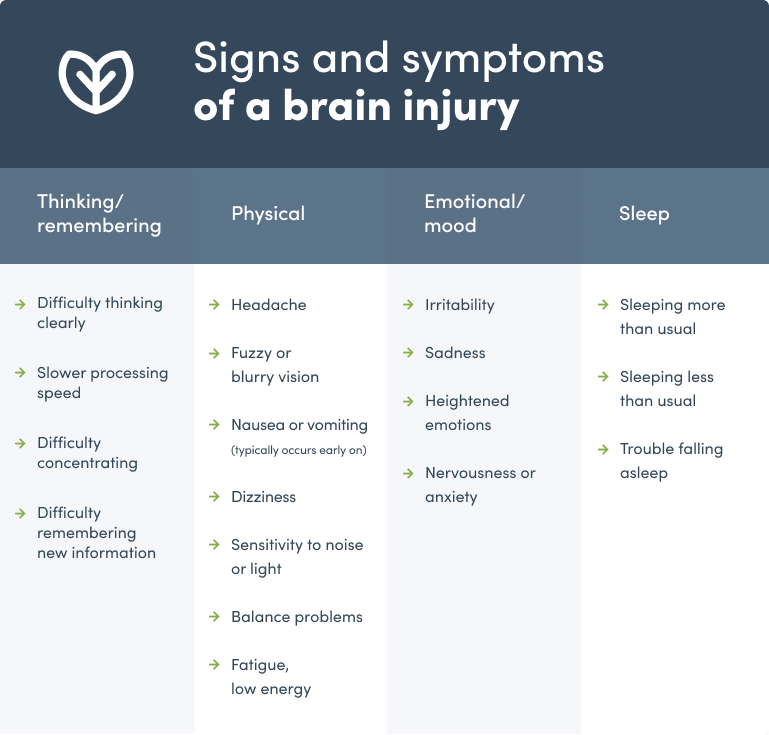Types and causes of brain injury
Your brain is prone to injury because it is a delicate organ. Your skull is the primary defense against brain injury, protecting your brain from outside trauma. (17) A type of fluid, known as cerebrospinal fluid, surrounds the brain for additional protection. Unfortunately, there are times when even your skull is not enough, and a brain injury may occur. Brain injury occurs when the neurons in your brain are damaged or the connections between the neurons are broken. Brain injuries are primarily categorized according to the cause as acquired brain injuries (ABI) or traumatic brain injuries (TBI).Acquired brain injury
An acquired brain injury (ABI) is damage to the brain that occurs after birth, meaning it is not related to a birth defect or degenerative disease. Most commonly, this term is used to describe brain injuries that have non-traumatic causes. (2) Many non-traumatic cases are caused by a lack of oxygen to the brain, whether it is a total loss (cerebral anoxia) or reduced flow of oxygen (cerebral hypoxia), that triggers brain cell death. Hypoxic brain injuries, which can be caused by numerous events, such as a head trauma, stroke, or cardiac arrest, can sometimes be difficult to diagnose if the brain is receiving enough oxygen to maintain its basic functions, often only presenting with mild symptoms such as inattentiveness or uncoordinated movements. (3)(13)
Traumatic brain injury (TBI)
In cases of traumatic brain injury, the damage is caused by an external force, such as a fall or motor vehicle crash. Impact to the brain is a common cause of TBI; however, TBIs can also result from other circumstances such as whiplash. This impact can damage your brain cells directly or the connection between the brain cell neurons. TBIs are typically characterized by the resulting damage. For example, mild TBIs are characterized as concussions, whereas moderate or severe TBIs are characterized as catastrophic brain injuries. (1)Types of traumatic brain injury
Concussion and catastrophic brain injury are two main types of traumatic brain injury.Concussion
Diagnosing a brain injury as a concussion can be difficult often because no physical or structural changes are identified by tests when a concussion has occurred (e.g., brain bleed). (10) Instead, concussions are often recognized by their signs and symptoms, such as dizziness, nausea, reduced attention and concentration, memory problems, and headache. In rare cases, concussions can also lead to a loss of consciousness; however, if the loss of consciousness lasts longer than 30 minutes, this would typically be considered a moderate or severe TBI. (1) Repeated concussions or head injuries can lead to a condition known as chronic traumatic encephalopathy (CTE). CTE is a condition that can appear years or decades after an initial brain injury. (16) CTEs typically develop progressively after repetitive brain injuries that occur earlier in life. These are often seen in athletes competing in contact sports, such as professional football players or boxers. In the early stages, we may see symptoms such as speech problems or impaired balance, and these may progress to more debilitating brain injury symptoms like ataxia (uncoordinated muscle movements impacting actions such as walking and eye movements), slowness of movements, or tremors. (11)Did you know? In 2014, about 2.87 million brain injuries were reported in the United States as a result of trauma. (6) In Canada, approximately 165,000 individuals per year are affected by serious traumatic brain injuries. (15)
Catastrophic brain injury
Catastrophic brain injuries have a quick onset and are a result of intracranial bleeding (bleeding within the skull) or cerebral contusions (bruising on the brain from blood vessel damage). These are more dangerous than concussions and require immediate medical attention. Signs that a bleed or bruising in the brain has occurred after trauma to the head include:- Headache that gets worse and does not go away
- Repeated vomiting or nausea
- Slurred speech
- Weakness, numbness, or decreased coordination (5)
Identifying a brain injury
Determining if you have experienced a brain injury can be difficult because the location of your brain injury can influence the symptoms you experience. The signs you may experience following a brain injury are outlined in the following table.
Brain injury recovery
When dealing with a brain injury, it is important to get the right healthcare support to recovery, and it’s also great to know what natural methods and treatments are available to support your recovery. Though most symptoms of a mild brain injury resolve themselves quickly, up to 20% of people continue to experience some persistent complaints. (14) This persistence is referred to clinically as post-concussion syndrome (PCS), and those who suffer from PCS may experience headaches, fatigue, anxiety, and cognitive problems (e.g., impaired memory, attention, and concentration). (8) To help reduce your risk of PCS, be patient with your body while it heals. As part of your recovery, your practitioner may recommend certain diet and lifestyle modifications, including:- Avoid activities that can worsen your injury (e.g., contact or recreational sports)
- Avoid operating a vehicle or heavy machinery
- Eat a nutritious diet rich in antioxidants (e.g., fruits and vegetables) and omega-3 fatty acids (e.g., fatty fish, walnuts, and flaxseeds) (7)
- Get enough restful sleep
- Limit physical activity (e.g., household chores, exercise)
- Limit challenging cognitive tasks that require focus and concentration
- Reduce screen time (e.g., computer tasks, playing video games)
- Refrain from drinking alcoholic beverages (4)

The bottom line
Though your body does its best to protect your brain, accidents resulting in a brain injury can happen. Pay attention to the signs and symptoms to look out for should you endure a brain injury. Immediately following a brain injury, it’s essential to seek medical attention. Remember to take time to rest if you are recovering from a brain injury. If you’re a patient recovering from a brain injury, speak to your healthcare practitioner for treatment recommendations.- Blennow, K., Hardy, J., & Zetterberg, H. (2012). The neuropathology and neurobiology of traumatic brain injury. Neuron, 76(5), 886–899.
- Brain Injury Association of America. (2020, August 4). ABI vs. TBI: What is the difference? https://www.biausa.org/brain-injury/about-brain-injury/nbiic/what-is-the-difference-between-an-acquired-brain-injury-and-a-traumatic-brain-injury
- Butterworth RF. Hypoxic Encephalopathy. In: Siegel GJ, Agranoff BW, Albers RW, et al., editors. Basic Neurochemistry: Molecular, Cellular and Medical Aspects. 6th edition. Philadelphia: Lippincott-Raven; 1999.
- Centers for Disease Control and Prevention. (2016, January). Traumatic brain injury & concussion. https://www.cdc.gov/traumaticbraininjury/index.html
- Center for Disease Control and Prevention (CDC). (2019).Traumatic Brain Injury & Concussion: Signs and Symptoms. https://www.cdc.gov/traumaticbraininjury/index.html.
- Centers for Disease Control and Prevention. (2019, March). TBI-related emergency department visits, hospitalizations, and deaths (EDHDs) | concussion | traumatic brain injury | CDC injury center. https://www.cdc.gov/traumaticbraininjury/pdf/TBI-Surveillance-Report-FINAL_508.pdf
- Gomez-Pinilla, F., & Kostenkova, K. (2008). The influence of diet and physical activity on brain repair and neurosurgical outcome. Surgical Neurology, 70(4), 333–335.
- Hall, R. C. W., Hall, R. C. W., & Chapman, M. J. (2005). Definition, diagnosis, and forensic implications of postconcussional syndrome. Psychosomatics, 46(3), 195–202.
- J F, McArthur D L, Silverman T A, Jayaraman M, Naravan R K, Wilberger J E, Povlishock J T. Epidemiology of brain injury, Neurology and Trauma. 1996. New York, McGraw-Hill.
- McCrory, P., Meeuwisse, W., Johnston, K., Dvorak, J., Aubry, M., Molloy, M., & Cantu, R. (2009). Consensus statement on concussion in sport: The 3rd international conference on concussion in sport held in Zurich, November 2008. British Journal of Sports Medicine, 43(Suppl_1), i76–i84.
- McKee, A. C., Cantu, R. C., Nowinski, C. J., Hedley-Whyte, E. T., Gavett, B. E., Budson, A. E., Santini, V. E., Lee, H.-S., Kubilus, C. A., & Stern, R. A. (2009). Chronic traumatic encephalopathy in athletes: Progressive tauopathy after repetitive head injury. Journal of Neuropathology & Experimental Neurology, 68(7), 709–735.
- National Institute of Neurological Disorders and Stroke. (2020, February). Brain basics: Know your brain. https://www.ninds.nih.gov/Disorders/Patient-Caregiver-Education/Know-Your-Brain
- National Institute of Neurological Disorders and Stroke. (2018) Cerebral Hypoxia Information Page. https://www.ninds.nih.gov/health-information/disorders/cerebral-hypoxia
- National Research Council, Institute of Medicine, Children, B. Y. O., Youth, C. O. S. C. I., Spicer, C. M., Ford, M. A., Rivara, F. P., & Graham, R. (2014). Sports-related concussions in youth: Improving the science, changing the culture (Illustrated ed.). National Academies Press.
- Northern Brain Injury Association. (2017, March 25). Brain injury statistics. https://www.nbia.ca/brain-injury-statistics/
- Roberts, G. W., Allsop, D., & Bruton, C. (1990). The occult aftermath of boxing. Journal of Neurology, Neurosurgery & Psychiatry, 53(5), 373–378.
- U.S. National Library of Medicine. (2020, December). Brain components. https://medlineplus.gov/ency/anatomyvideos/000016.htm





